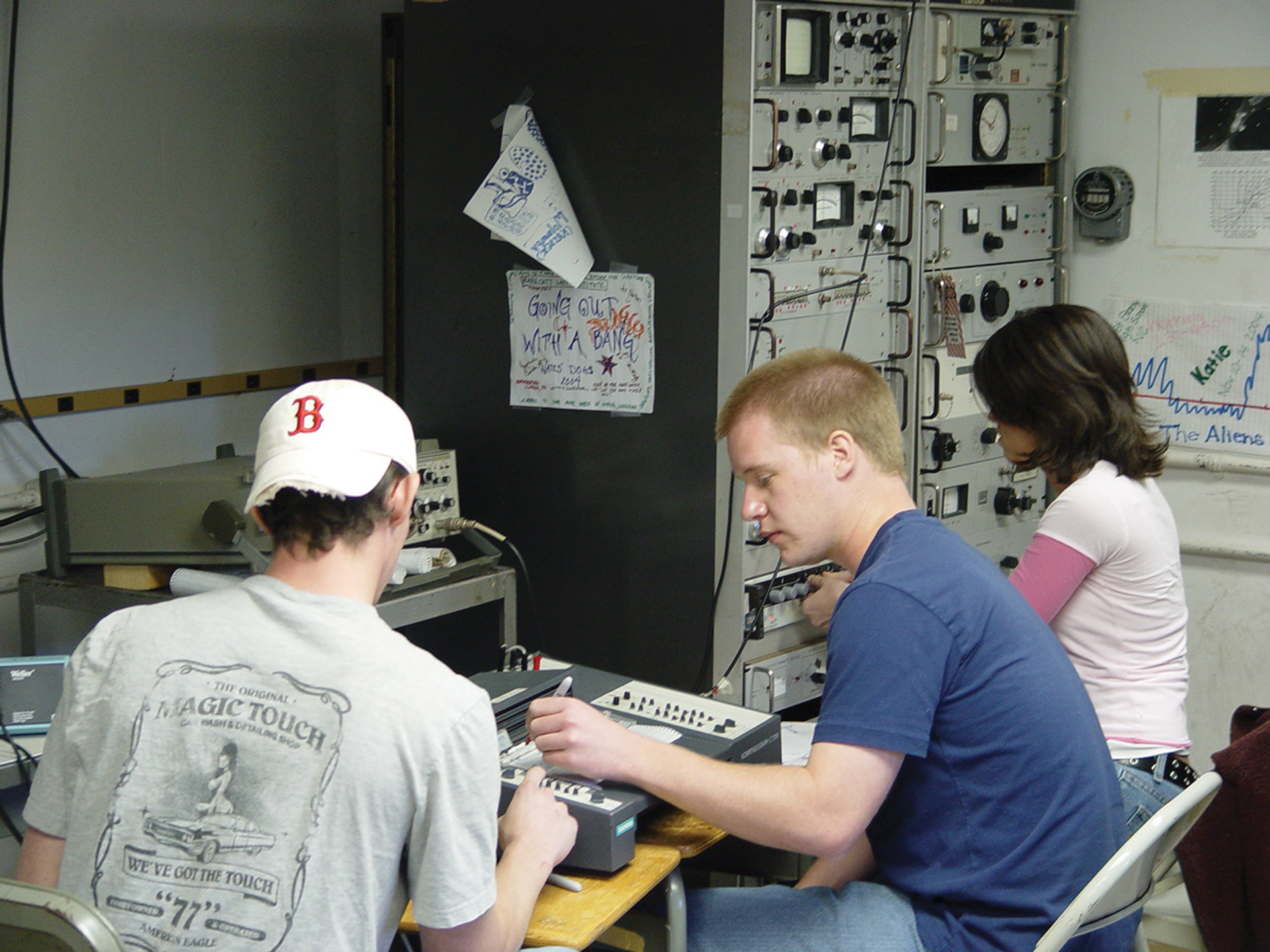Early engagement in authentic STEM research motivates students to enter into and persist on a STEM path toward becoming a STEM professional, and the Green Bank Observatory provides many opportunities for students to practice science and engineering. Some require your presence onsite, but we also have online opportunities.
Undergraduate and Graduate Research Internships
If you are an undergraduate or graduate student seeking a research experience, please visit this page to learn more about opportunities for you. We offer paid undergraduate internships in astronomy, engineering, and computer science, with appointments running from late-May through early-August. We also offer unpaid “Graduate Student Residencies”, where graduate students can visit the observatory for extended periods to work with Green Bank staff, with housing and office space provided at no cost.
Pocahontas County Science Fair
The Green Bank Science Center hosts the annual county-wide science fair for students in grade 3 and up. We’ll visit your school and help students design science and engineering experiments. On Fair Day, students spend the whole school day at the Observatory and participate in hands-on activities and demos, as well as having their projects judged of course!

Radio Astronomer for a Day – Grades 5+

What sets a scientist apart is that they tackle questions that don’t yet have answers. You can’t just “google it” when you are doing science. School groups and youth groups of all kinds and ages may visit the Observatory for an overnight stay or participate virtually. Conduct observations with a working radio telescope! For in-person visits, we supplement the program with tours and hands-on activities as well. This program meets NGSS Nature of Science standards.
Program cost: Free!
Room & board: Costs vary, contact gro.y1771193464rotav1771193464resbo1771193464bg@sn1771193464oitav1771193464reser1771193464
For more information visit our field trips page.
Skynet Junior Scholars
Sharing the Universe with youth. That’s what Skynet Junior Scholars is all about. Youth Leaders and Educators sign up for Skynet Junior Scholars (SJS) and can then enroll students in an SJS Club. That’s when the fun begins!
Leaders and youth gain access to research grade telescopes around the world including a 20 Meter Radio Telescope here in Green Bank! Through a series of fun observational astronomy activities, you can take images and radio data, do experiments, earn online badges, and participate in research projects like tracking asteroids. Collaborate with others via our online forum and team projects. All the learning and observing is online, so what are you waiting for?

Pulsar Science Collaboratory
The Pulsar Science Collaboratory (PSC) is a joint project between the Green Bank Observatory and West Virginia University (WVU), funded by the National Science Foundation (NSF). The goal of the PSC is to give high school students, early college students and their teachers experience doing real research, all while helping pulsar astronomers analyze mountains of data to search for new pulsars!

Would you like to join the team? Twice each academic year we hold a six-week online course to prepare you to be diligent researchers. Students, teachers and professors can sign up. Once you pass muster you will be granted access to “raw” data, and the research begins. Active teachers and students may apply to summer camp and attend annual capstone events as well. We have a dedicated website for the project. Learn more and apply to become a PSC member!
Physics Inspiring the Next Generation: Exploring the Cosmos Summer Camp
PING aims to expose rising 9th-graders to science and engineering with a focus on physics and radio-astronomy. Launched in 2014 as a collaboration between the National Society of Black Physicists (NSBP) and the National Radio Astronomy Observatory (NRAO) in partnership with Associated Universities, Inc., the the PING program focuses on multiple levels of the physics and astronomy pipeline, and includes a week-long summer camp that engages middle school students in physics and astronomy.
PING Summer Camp. Rising 9th-graders will attend camp for 7 days in 2026, and will be immersed in the research activities of Green Bank Observatory. Students will work in small teams supported by an undergraduate student mentor and a staff scientist (astronomer, physicist, engineer, etc.) to conduct research by observing the universe with a 40-foot diameter radio telescope. Supplemental educational activities, including bench experiences building electronic circuits, and chemistry activities complement the primary research theme and enhance our engaging atmosphere. In addition, fun group activities like star gazing, games, hiking, and talent-share sessions (where mentors teach campers anything from a new language to origami) will take place to promote community building and the overall camp experience.
Applications are due on the 3rd Monday in May. For more information, including application instructions, check out the website by clicking the header link above!
Questions about the PING program? Please contact ude.o1771193464arn@t1771193464niase1771193464ds1771193464

WV Governor’s STEM Institute

*CANCELLED FOR 2026 DUE TO STATE BUDGET CUTS*
Green Bank Observatory hosts the WV GSI for 60 talented 8th graders from around the state who love science, engineering and math. This two-week residential program engages students in radio astronomy research, STEM explorations, outdoor activities and community, all set within an internationally renowned federal research center (the Green Bank Observatory). Applications are submitted to the WV Department of Education. We also seek teachers and undergraduate student mentors to help lead this program. For more information about the application process and links visit: https://wvde.us/gov-schools/








